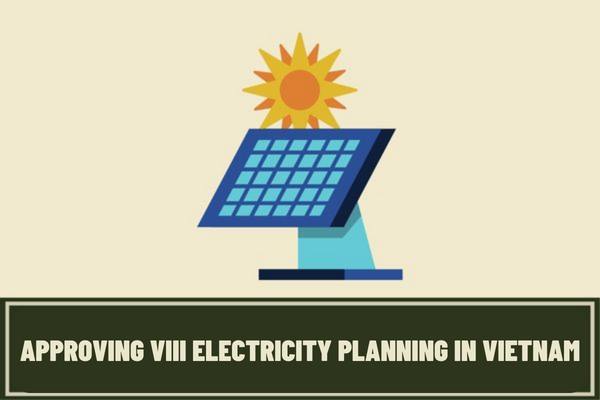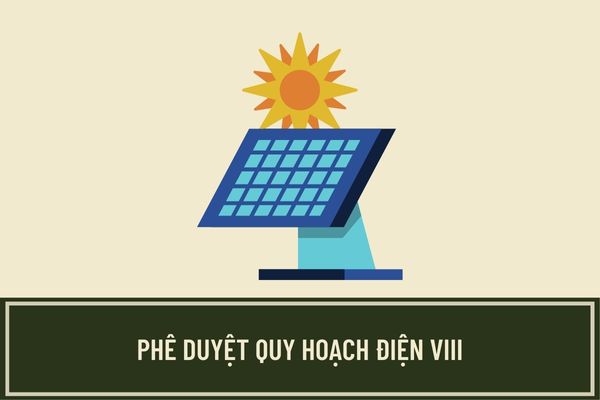Vietnam: Decision No. 500/QD-TTg in 2023 approving VIII Electricity Planning with the objectives that by 2030, 50% of office buildings and 50% of houses use solar power?
- Did the Prime Minister officially approve the VIII Electricity Planning in Vietnam?
- The objectives by 2030, 50% of office buildings and 50% of houses use solar power?
- How much investment capital does Vietnam need to implement VIII Electricity Planning in Vietnam?
- What are the responsibilities for the data of the Ministry of Industry and Trade of Vietnam?
Did the Prime Minister officially approve the VIII Electricity Planning in Vietnam?
On May 15, 2023, the Prime Minister officially issued Decision No. 500/QD-TTg in 2023 approving the national electricity development planning of 2021 - 2030 and vision for 2050 (VIII Electricity Planning).
According to that, the VIII Electricity Planning covers electricity sources and transmission grids of a minimum voltage of 220 kV, renewable energy and new energy industries and services in Vietnamese territory during the period of 2021 - 2030 and vision for 2050, including structures connecting the electrical grid with neighboring countries.
VIII Electricity Planning ensures national power security and satisfies socio-economic development, industrialization, modernization requirements.
In addition, successfully implement fair energy transition associated with modernizing production, develop smart electrical grids, and govern electrical systems advanced, conforming to worldwide trends of green transition, emission reduction, and science and technology development.
At the same time, establish general power industry ecosystem based on renewable energy and new energy.

Vietnam: Decision No. 500/QD-TTg in 2023 approving VIII Electricity Planning with the objectives that by 2030, 50% of office buildings and 50% of houses use solar power?
The objectives by 2030, 50% of office buildings and 50% of houses use solar power?
In Decision No. 500/QD-TTg in 2023, the objectives set out in the national electricity development planning of 2021 - 2030 and vision for 2050 (VIII Electricity Planning) include:
(1) Regarding assurance of national power security:
- Meet domestic electricity demands, satisfy socio-economic development goals with average GDP of around 7%/year for the period of 2021 - 2030, around 6,5 - 7,5%/year for the period of 2031 - 2050;
- Provide electricity safely, reliably, and in a manner that satisfies N-1 requirement for important load zones and N-2 requirement for especially important load zones. By 2030, Vietnam’s electricity reliability is placed among ASEAN’s top 4 countries, Vietnam’s electricity access is placed among ASEAN’s top 3 countries.
- By 2030, 50% of office buildings and 50% of houses use self-consumption solar power models (power is consumed in the area where it is generated instead of being sold to national electricity system).
(2) Regarding just energy transition:
- Extensively develop renewable energy sources for electricity production so that percentage of renewable energy reaches around 30,9 - 39,2% by 2030. Attempt to increase percentage of renewable energy to 67,5 - 71,5% by 2050.
- Control the level of greenhouse gas produced by modern production processes down to around 204 - 254 million tonne by 2030 and down to around 27 - 31 million tonne by 2050.
- Develop smart electrical grids capable of integrating with and safely, effectively operating on large-scale renewable energy sources.
(3) Regarding development of renewable energy industry and service ecosystem:
- By 2030, establish 2 centers for interregional renewable energy industry and services in potential areas such as the Northern region, the South Central coast, and the Southern region when conditions are right.
- Develop electricity sources from renewable energy and produce new energy for export; By 2030, electricity export capacity reaches around 5.000 - 10.000 MW.
How much investment capital does Vietnam need to implement VIII Electricity Planning in Vietnam?
In Decision No. 500/QD-TTg in 2023, it is clearly stated that Vietnam's investment capital needs to implement VIII Electricity Planning as follows:
- For the period of 2021 - 2030: Total investment for electricity sources and transmission grids is expected to be equivalent to 134,7 billion USD, where investment for electricity sources is around 119,8 billion USD (averaging at 12,0 billion USD/year) and for transmission grids is around 14,9 billion USD (averaging at 1,5 billion USD/year).
- Direction for 2031 - 2050: Investment demand for development of electricity sources and transmission grids is expected to be equivalent to 399,2 - 523,1 billion USD, where investment for electricity sources is around 364,4 - 511,2 billion USD (averaging at 18,2 - 24,2 billion USD/year) and for transmission grids is around 34,8 - 38,6 billion USD (averaging at 1,7 - 1,9 billion USD/year) which will be specified in subsequent planning.
What are the responsibilities for the data of the Ministry of Industry and Trade of Vietnam?
Pursuant to Article 2 of Decision No. 500/QD-TTg in 2023 stipulating the responsibilities of the Ministry of Industry and Trade of Vietnam as follows:
Ministry of Industry and Trade of Vietnam shall be responsible for accuracy of data, documents, graphs, maps, and database in planning documents and compliance with Decision No. 500/QD-TTg in 2023.
At the same time, organize publishing of the planning as per the law and implementation of Decision No. 500/QD-TTg in 2023 together with implementation of socio-economic development tasks as per the law; develop Plan for implementation of the planning based on criteria and reasoning under Decision No. 500/QD-TTg in 2023 in order to implement objectives and tasks under the planning; organize evaluation of planning implementation in accordance with the Law on Planning.
Present the Plan for implementation of Planning to the Prime Minister in June 2023.
- Take charge and cooperate with ministries, central departments, and local governments in developing and presenting the amended Law on Electricity and Law on Renewable Energy to the National Assembly in 2024.
Present policies on direct power purchase to the Government.
- Take charge and cooperate with ministries, central departments, People’s Committees of provinces and central-affiliated cities in working with project developers, reviewing regulations of the law, commitments, and agreements between parties to thoroughly deal with projects under Schedule 3 of Appendix II which are facing difficulties in implementation and report issues beyond their competence to the Prime Minister.
On the other hand, the Prime Minister assigned central departments, and Committee for Management of State Capital at Enterprises to fully perform their functions, tasks and powers to to keep up with progress of projects in the VIII Electricity Planning;
And propose regulations, policies, and solutions for issues in order to effectively achieve objectives of the planning, ensure consistency and synchronous with the implementation of the 10-year Socio-economic Development Strategy and socio-economic development plans of each sector and local government.
LawNet
